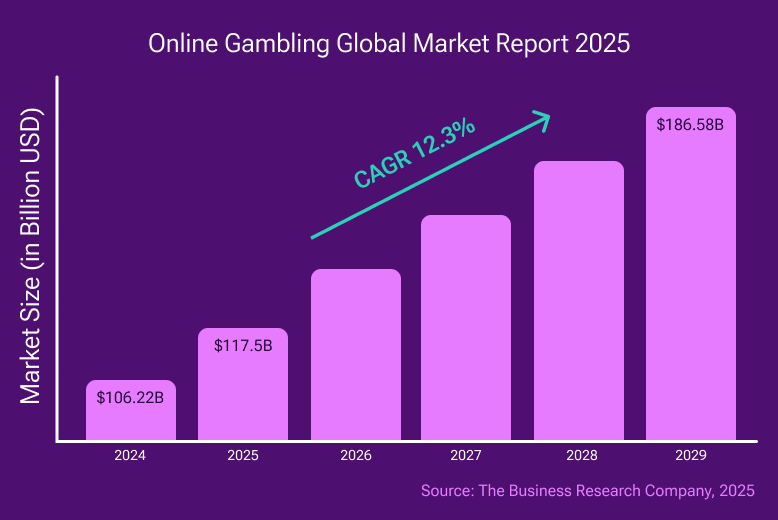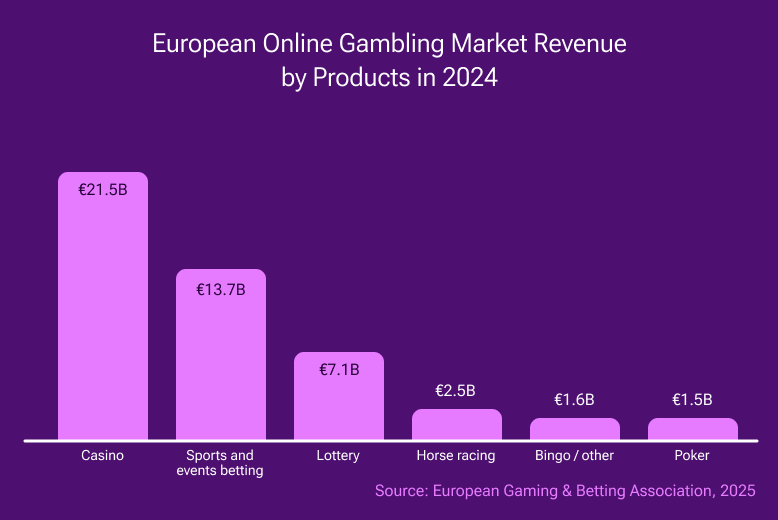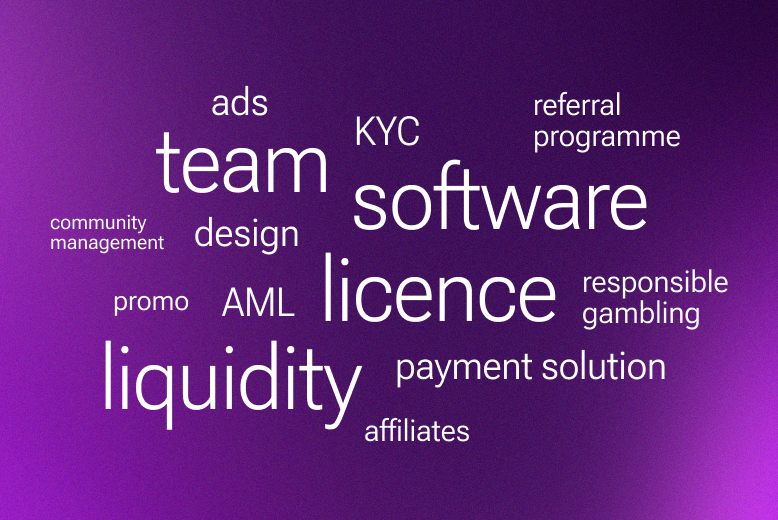If you’re looking for good business ideas and considering starting a business in the online gambling sector but have no prior experience, we recommend beginning with online poker. This article will help clarify the key points, dispel common doubts, and guide you towards making the right decision.
In this article, you’ll learn about the advantages and risks of entering this market, the first steps you’ll need to take, and some practical tips to help ensure your launch is as successful as possible.
Who Is Best Suited to Start an Online Poker Business?
An online poker business is not a source of passive income — it’s an active venture that requires ongoing management and engagement. While everything can be learned over time, you’ll find it much easier to enter the industry if you already have experience in one of these fields:
- Entertainment Industry: Those with a background in entertainment understand how to capture and maintain audience attention — a critical factor in developing a thriving poker room.
- Community Management: Skills in building and nurturing active communities around a brand will help you quickly form a loyal player base without heavy advertising costs.
- IT and Startups: Experience in managing digital products, using analytics, and rapidly adapting to market needs will enable the efficient growth of a poker project.
- Financial Investment and Asset Management: Strong skills in risk assessment, profitability analysis, and resource allocation will help you build a sustainable financial model for your room.
- Affiliate Marketing and Traffic Management: The ability to attract high-quality traffic through affiliate programmes and advertising channels is a major advantage for rapid expansion.
- Media Projects and Influencer Networks: Owners of media outlets or influencer networks can leverage their platforms to promote their poker room and attract their first wave of players.
- Customer Service and Loyalty Programmes: Experience in delivering excellent customer service and developing loyalty schemes will support player retention and maximise their lifetime value.
- Poker Gaming: Personal experience playing poker or participating in the poker community provides valuable insight into player motivations and behaviour.
Pros and Cons of Investing in the Online Gambling Industry
The Key Advantage #1: iGaming is a high-margin industry that, with the right strategy, can deliver excellent profits across all its verticals — including casino, sports betting, poker, bingo, and more.

The Key Advantage #2: The global online gambling market is experiencing rapid growth year after year. According to data from The Business Research Company, the market is expected to reach US$106 billion in 2024, with forecasts predicting growth to US$187 billion by 2029. This upward trend is visible across all key regions — Europe, North America, Latin America and South America, Asia, and Africa.

Like any sector, the online gambling industry comes with its own set of risks that you need to be prepared for.
- High Competition: Even in emerging markets, you need to be competitive from day one. Offering a high-quality gaming experience is crucial to attracting and retaining players.
- Changing Regulations: The regulatory landscape is constantly evolving, including rules around operations, advertising, and compliance. In some countries, such as the United States, gambling laws are extremely strict, and meeting all legal requirements can be quite challenging.
- Security Issues: Gambling businesses are frequent targets for cybercrime, fraud, and money laundering. This means you’ll need to invest significant time and resources into building a robust security system.
- Reputation Risks: Despite the fact that gambling mechanics are now widely used across the broader gaming industry — from mobile apps to AAA video games — online casinos and real-money card games still face a degree of social stigma. Within the industry, it’s often joked that we are treated almost like adult content sites. If you are a public figure, this could potentially be a concern.
Why We Recommend Investing Specifically in Online Poker
When looking at market share diagrams for different online gambling products, it may seem that online casinos are the most attractive vertical. However, there are several reasons why online poker could be a smarter choice for your investment.
- Strong Profit Potential: The online gambling industry is huge, and even a smaller vertical like poker represents significant revenue opportunities.
- Room for Expansion: Once your poker business reaches a stable level of success, you can expand into other verticals. Poker combines particularly well with sports betting, as both attract audiences with similar behaviours and interests. About 20% of poker players bet on sports, and 13-15% of them play casino games.
- Less Fierce Competition and Acquisition Costs: Online casinos are by far the most competitive part of the industry. While no vertical is easy, the online poker market is more welcoming to newcomers and tends to be more forgiving of early mistakes. Player acquisition in poker demands 3 to 6 times less money than in a casino.
- Easier Regulation: Online casinos typically face stricter regulatory scrutiny compared to poker or sports betting. Plus, there are options such as social poker, sweepstakes, and poker clubs that don’t involve real money wagering, allowing you to operate under lighter regulations.
- Lower Investment Requirements: If you’re new to the industry or unsure about your success, poker offers ways to start with relatively low upfront costs. Unlike online casinos, in poker, players win and lose against each other, so you don’t need to maintain a large bankroll for payouts.
- Minimised Financial Risks: Unlike casinos, where an operator could occasionally lose money if payouts exceed income, poker operators don’t face that risk. Since players play against each other, it’s virtually impossible for the business to suffer losses from game outcomes.
- Lower Stigma: In poker, players compete against each other, and your role as an operator is simply to organise the games and take a small commission (rake). Your revenue doesn’t depend on players winning or losing against the house. Poker is also widely recognised as a skill game — last year, it was officially acknowledged by the International Mind Sports Association. As a result, poker carries much less negative public perception compared to other forms of gambling.
How Online Poker Rooms Make Money
As mentioned earlier, poker room operators don’t earn money from players’ losses — they make money from the game itself. In this sense, poker is closer to the broader entertainment industry than it is to online casinos. While there are many strategies and tricks to optimise profitability, the basic revenue model looks like this:
- Poker rooms earn through a commission called the rake.
- When players sit at a table and place bets, a pot is created during each hand. The poker room automatically takes a small percentage of the pot — typically between 3% and 5% — as a fee for hosting the game.
- In tournaments with a fixed entry fee, the commission is built into the buy-in. For example, if a player pays $11 to enter a tournament, $10 goes into the prize pool, and $1 is kept by the poker room.
The more players you have and the more hands they play, the greater the revenue for the poker operator.
What You Need to Prepare for an Online Poker Business

- Licensing: Almost all jurisdictions require a licence from the regulator for a poker room to operate legally. Ensuring compliance is a must to avoid legal issues down the road.
- Software: You can hire developers to create your own platform, but a more cost-effective and efficient solution is to partner with a software provider that already has the necessary security systems, tools, and certifications required for licensing. This also removes the burden of technical maintenance from the operator. Typically, the software provider charges a small commission on the room’s revenue.
- Team: You’ll need a dedicated support team to handle player inquiries and address any potential fraud reports. Additionally, managers are required to oversee project growth and ensure a high-quality gaming experience for users.
- Liquidity: Since players compete against each other in poker (not against the room), liquidity is crucial. It’s essential for your poker room to have active tables at all hours, ensuring new players can always join a game. The more active players you have, the more attractive your room will be to newcomers.
Of course, this is not the full to-do list, but rather the most basic matters. In addition, you will need to address design, payment solutions, KYC, and so on. While this may seem daunting for newcomers, there are poker business models that can simplify these challenges and make the process smoother.
Subscribe to our weekly email updates and get your free Poker Marketing Guide now
The Best Way for a Beginner to Start a Poker Business
For newcomers to the poker industry, the most convenient way to start a poker business is by joining a poker network as a “skin” (operator). This approach offers several significant advantages.
- Lowest Investment: Joining a poker network is the most cost-effective option. The network provides all the necessary IT infrastructure, which saves on development costs and technical overhead.
- Quick Launch: A poker network offers the fastest time-to-market compared to other poker business models, allowing you to start operating quickly.
- Liquidity from the Start: Players across all skins in the network form a unified player pool. This means that even if you struggle to attract a large number of players initially, your users will always have opponents, and you won’t face the issue of player churn due to a lack of competition.
- Assistance with Licensing and Operations: Poker networks take on some of the responsibilities for game organisation and player retention, such as running tournaments and leaderboards that include players from all operators. Additionally, they handle fraud monitoring. Networks, such as WePlay, even assist their operators with obtaining licences.
Typical Skin Case in a Poker Network
Here’s a real-life example based on data from one of our clients — a typical case of an operator who joined a mid-sized poker network.
Integration: Low Initial Investment
- The integration process was designed to keep initial costs as low as possible. This option allowed the operator to focus on building the business while leveraging the network’s infrastructure.
Deposits: Cryptocurrency Only
- The operator accepted only cryptocurrency deposits, aligning with the growing trend of digital currencies in the gaming industry.
Starting Liquidity
- The network provided over 50 active cash-game tables simultaneously at the start, in addition to tournaments with guaranteed prizes exceeding $300,000 (provided by the network). This helped establish liquidity quickly.
Challenges
- The initial distribution of players was unbalanced. This issue was addressed by introducing increased bonuses (rakeback), which helped attract and retain players.
Marketing: Community Management Only
- The operator focused on community management for player engagement. No media buying or affiliate models were used during the first phase of operations.
Results in First Three Months:
- Daily Active Users (DAU): Between 30 and 50 players.
- Average Monthly Revenue: 80% of the initial launch costs.
- Average Monthly Running Costs (including provider fees and player bonuses): 30% of the revenue (GGR).
Six-Month Forecast
- With an increase in DAU to 100 players and a balanced distribution across limits, the operator is expected to see monthly revenue equal to 300% of the initial launch costs, assuming default rake levels.
How EvenBet Gaming Can Be Helpful
Software and Technical Infrastructure
EvenBet Gaming is a provider of software for the iGaming industry. In 2024, we were recognised as the best poker supplier.
We offer software equipped with an extensive set of features to create a cutting-edge gaming experience, as well as all the necessary tools to run a business: financial instruments, promotional tools, affiliate and referral programmes, custom reports, lots of analytics, and more. To ensure the security of our clients and their players, we have advanced anti-fraud modules, tools for KYC, and anti-money laundering (AML) measures. We also offer a player self-exclusion tool to promote responsible gaming, as required by legislation in many countries. Our software holds numerous certificates necessary for licencing in various jurisdictions, enabling legal operations.
We release new versions of our software twice a month, providing more tools and features to enhance the gaming experience and make project management more efficient.
Consulting
When interacting with our clients, we act more as a business partner. Since our income is directly tied to the operator’s profitability, we put in maximum effort to ensure our client’s business is successful, and our cooperation is productive and long-term.
We have been operating in the iGaming industry for over 20 years and have accumulated vast experience during this time, which we eagerly share with operators by offering optimal solutions based on best practices.
Onboarding
We rarely work with complete newcomers to iGaming, but we often assist clients who only have experience in online casinos or sports betting. As the poker business operates differently and our product is quite complex, we have established a thorough training system for operator teams.
Additionally, we provide detailed documentation to help users make the most of our product. We also continuously create guides and instructions to ensure our clients use various features as efficiently as possible.
Service and Support
We are always in contact with our clients. We provide round-the-clock support to ensure the smooth operation of poker projects and address any issues that may arise.
Conclusion
Online poker is a profitable business that is quite engaging to be a part of. If you’re interested, get in touch with our managers, and they will help you find the most risk-free starting option. You will have the opportunity to test the waters of the industry with minimal investment, and if you enjoy the world of iGaming, we can later discuss options for more comprehensive projects.





 Upd: 19 December 2025
Upd: 19 December 2025 






















